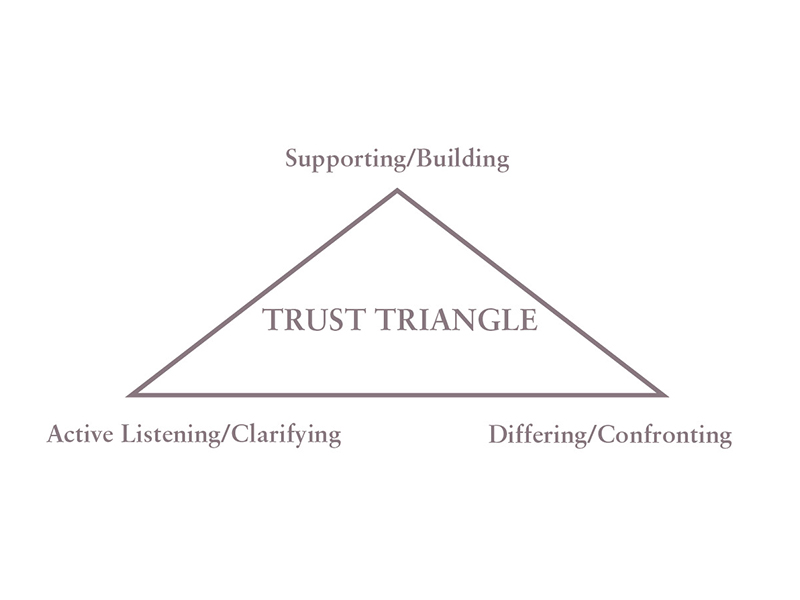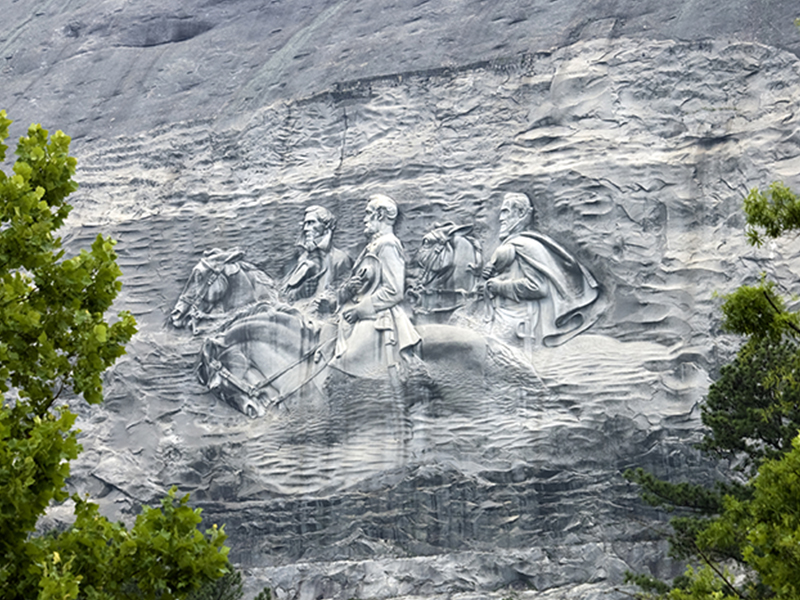Many personal conflicts seed and grow from conscious and unconscious acceptance of ancestral conflicts. Until we understand our inheritance we can be trapped inside it. Remember that when I am called to work a conflict I begin with a question like “When did you first meet this person and how did that go?” It’s worth checking to be sure both your ancestors didn’t first meet several centuries ago. This blog includes two personal stories of healing the Root and Web of ancestral conflict.
Rare is the conflict that stands on its own legs. Many personal conflicts seed and grow from conscious and unconscious acceptance of ancestral conflicts, often embedded in our born-to-place in the caste system. Until we understand our inheritance we can be unconsciously trapped inside it.
Many traditional people begin their ceremonies by calling in their ancestors; others have elaborate ritual events that honor ancestors at proscribed periods of time after their death. Many tribes are requesting the remnants of their ancestors be returned to them from museums and archives. Here’s an example from the Wyoming Wind River Reservation.
Many people don’t know their ancestors, and in some cases, information about them was purposefully left behind. I remember my aunt starting to say something about one of my ancestors, stopping mid-sentence, and saying “No, there’s no reason to pass that story along.” No begging on my part filled in the answer.
Our myths and stories are our worldwide, generic inheritance of our ancestors’ wisdom. Becoming conscious is the fairy tales’ sorting seeds exercise – what is life giving and what is not? Do we want to leave this message behind, or take it forward? What injures us or others, makes us ill or is based in conflict? What heals us and opens the future?
Bloodline Conflicts
I am of Scottish heritage on my mother and aunt’s side, and on my father’s of refugees who fled to New York territory, and then fought in the Revolutionary War against England. I have a friend whose bloodline came from Cornwall, which is physically inside the south of England and has been “English” considerably longer than, say, Scotland. He sent a letter to me from Cornwall.
I went to Cornwall to look up my ancestral line. Standing in a cemetery by the tin mines that were there before the Romans and Joseph of Aramathea I saw many grave markers with my name. Approached by a man at the cemetery, I ended up being invited to a pub where there was a meeting about the Cornish uprising being planned (down through the generations) in case the opportunity ever arose to secede from England. Stories from family lines were told that had to be hundreds of years old. As I listened I heard my own father’s voice saying “This isn’t England. We pay the taxes, but don’t owe the Feds any more than that.” My father might as well have been sitting at the table in the pub. And that’s my attitude as well, swallowed hook, line and sinker.
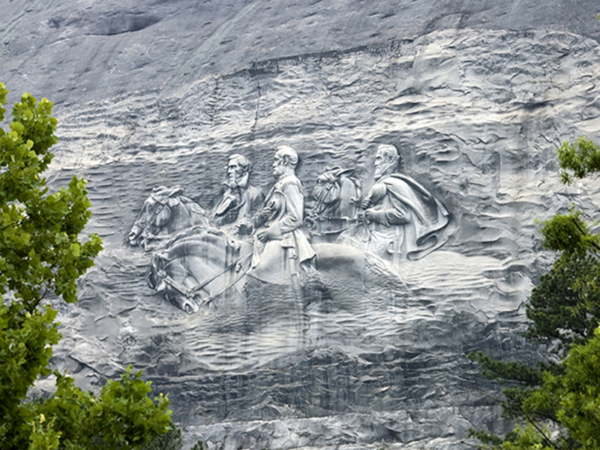
When I traveled in the southern United States I observed the names of my clan over and over – and felt in my bones what I know intellectually: many who survived the Scottish clearances settled in the southern United States. I visited Stone Mountain, GA, and discovered there are states’ platforms/picnic areas on the grassy slope to the mountain’s root. To enter, you step on a two-foot bronze inset of the state, with the words “seceded on…; readmitted on….” Some people were staring at the mountain while others prepared the family picnic, children playing nearby. Looking at the carved figures of the Confederate heroes riding out of the stone I thought: Many in and from the southern states view their land as an occupied country because many came from an occupied country (e.g., Scotland). It seems possible that the Civil War was a reverberation of the occupation of Scotland by the English and the clearances. Descendents are emotionally and intellectually still “fighting the British” – only the names have changed. Neighbors today are engaged in that war again.
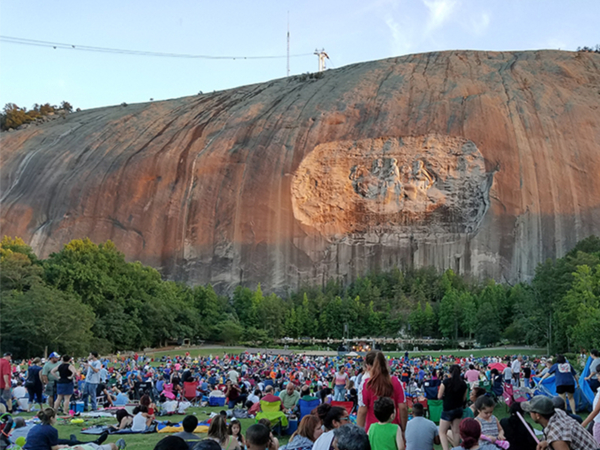
How the Ancestors Influence Personal Conflicts
Once when I was in Scotland, I visited the Culloden battlefield, which is where the British defeated the Highland Clans, and then instituted policies to purposefully break the Highland way of life (what you couldn’t wear, sing, do, be, traditional land taken away, etc.). Many individuals and families left Scotland during this time. In a way. I at Culloden, and the families at Stone Mountain, were honoring, perhaps worshipping, this past. And perhaps still carrying anger and grief for a way of life that has been gone for a very long time. And – surprise – it may never have existed as now enshrined. But the energy of the story has created a “conserve”, a distillation of belief considered to be The Truth, the situational and psychological surround of precious cultural memories.
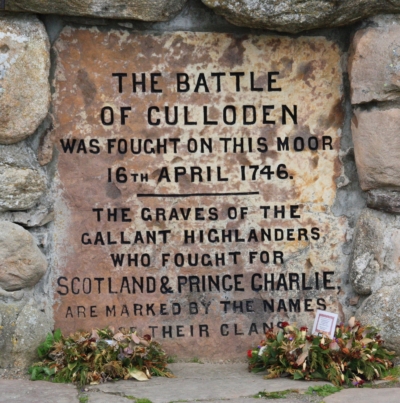
What is in the baggage we carry around, unconscious of the hooks we trail? People in advertising, social media and politics know about these hooks, know old messages. They reinforce them to sell platforms and products to us. Most of us go or don’t go to college based on some ancestral message. Some might still “marry well” from “the right side of the tracks”. Often we see our choices as either to follow in the path laid down for us, or to rebel against it.
It is possible that both you and your conflict partner’s Attitude is an inheritance carried into a current-day conflict. You both may be engaged in the conflict with a whole bloodline of people standing behind you both. You may have selected current family/friends with similar values and understandings, and your conflict partner is different, and Other than your conserve. It’s useful to know that possibility is present.
So first look now at the person – the individual soul – who is your conflict partner. Start externally, maybe with the person’s head: what messages do you carry around hair? (bald/curly/red?) Foreheads? (brainy/worried) Eyes, cheekbones, mouth… we’re only getting started. What color is the person? What ancestral line? How educated? What story about this person are you telling yourself consciously and unconsciously? And how does that story affect your ability to work through this conflict successfully?
Going Fishing along my Ancestral Line
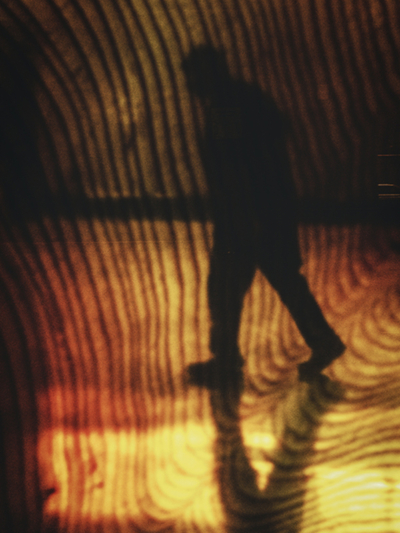 Long ago in a Celtic shamanic training workshop, we were given the task of walking back along the ancestral line until we reached the grief point (or flashpoint), and holding ground there until we could integrate it. I found myself walking (vision), in heavy boots and a long wool skirt, along a dusty road that went on and on. I trudged. Then a man, husband, and clansman, was trudging by me, then I was carrying a baby, then another baby while a boy held my right hand. We trudged on. And on. It came to me after a long time that I could trudge on forever unless I did something. At first not knowing what I should do, I then found myself beginning to sing. So now we walked along, but the little family had music. And that changed everything.
Long ago in a Celtic shamanic training workshop, we were given the task of walking back along the ancestral line until we reached the grief point (or flashpoint), and holding ground there until we could integrate it. I found myself walking (vision), in heavy boots and a long wool skirt, along a dusty road that went on and on. I trudged. Then a man, husband, and clansman, was trudging by me, then I was carrying a baby, then another baby while a boy held my right hand. We trudged on. And on. It came to me after a long time that I could trudge on forever unless I did something. At first not knowing what I should do, I then found myself beginning to sing. So now we walked along, but the little family had music. And that changed everything.
Our teacher instructed us that, when we reached a shift, to cross to the other side of the room, which the teacher said was a realm of peace. We were to stand in a particular stance, breathe, hold the space for those not finished with Part I, and wait. After crossing over, I simply could not lift my arms – my hands wanted to hold a fishing line, which I was to pull on. And pull I did, singing, and on the line were tiny silver fishes, about eight inches apart, on alternating sides. I recognized them as the souls of my ancestors, left trudging until now, and I was pulling them over into the new realm, the place of peace. Standing there, pulling, I realized again that I could stand there my entire life and pull that line. What to do? I kept pulling and singing, and then I thought “I’ll send the song back along the line.” So I thought of the line as a kind of trans-realities wire and sent the song.
The following day our teacher was giving us the wisdom associated with our clans – what we were responsible for. Mine? Music. In particular, as Stewart (Steward), we were to sing the land awake each morning, and into the dark at night. My ancestors and descendants, the vast majority of whom were/are very musical, have forgotten why that talent lives in our veins. Another teacher gave us the assignment of reaching back to our last happy ancestors. In the obituary of the man who immigrated from Scotland I found these words: “We will miss him for he always went about town singing, and taught many of us to carry a tune with him.”
What Do We Do With Our Ancestral Understandings?
If I pull enough of my ancestor fish over into the new place of peace, of prosperity, of hope, will conflicts based in this old story stop? I don’t know; it feels more like the title of the Russian story “I went I know not whither, and fetched I know not what.” I can’t know exactly what was done but feel I healed a break of some sort, retrieved something back into consciousness, and sent a new song back down the line.
Many strong, brave people are taking on this type of ancestral work in ritual ways. Great-grandchildren of slave traders and owners are talking with the great-grandchildren of slaves. Native peoples are teaching the ways to heal our climate quandary. I know this: my part is only one part of a vast world of people doing this holy work. I know also that if I don’t do my part there is a hole where my work should be, ready to be woven in. Maybe the ghosts come through those holes and get involved when two people living in the present time catch each other’s ancestral trailing hooks.
The Campbells are Coming! Oho! Oho!
“Never trust a Campbell” is a Scottish saying, based in a guest honor betrayal, the Glencoe Massacre of 30 people of a sect of my husband’s clan.
No one in my family sat me down and told me this story, saying “let it be a lesson to you!” It was an accumulation of moments:
- At a family sing my request “Let’s sing The Campbells are Coming! We never sing that one…” is answered “No, we don’t. Nor will we.”
- I make a friend in school whose last name is Campbell. When invited for an overnight, my mother stops by to interview the family before agreeing, the only time she’s done this.
- My grandmother, a school teacher and accomplished musician, when reading aloud an article about how Campbell soups are too salty for health, comments “See! Once again they’re trying to kill us.”
The Glencoe Massacre occurred on Feb. 13, 1692 – several centuries ago. And who is the “us” they are trying to kill? My Stewart clan is really from Brittany and some Scots don’t recognize them as “Scottish” since they’ve been in Scotland only since the 700’s. History is mixed, and when you really study it you discover the interwoven complications – the Campbells at Glencoe Massacre were under fierce pressure from the English crown. Some Campbells sent warning. Everything is very complex. Easier to reduce the whole thing to “Never trust…”
But mistrusting Campbells is problematic when Joseph Campbell is a major teacher in your life. Do I not hire the top candidate for a job because her last name is Campbell? I begin to think about ritually healing this rift between our clans – it’s not healing a hot spot in the world, but it might be a step towards general peace. How could that be done? I bring up to various people at various times. “Let’s have a ritual where we invite the Campbells, tell the old stories on both sides, and forgive each other. We could “lay it down”. These scouting moments were not met enthusiastically, and at times I could see the comment pass by the ears and go into the airways, not even heard by the intended. So I held that idea in my heart and just kept poking at it.
Sometime later the Stewarts were hosts at the Scottish Games in Estes Park to the national Stewart clan – people from all over the world. My region chieftain, Ian Wilson, called on us for two things: Lola to help organize a high tea, and actor husband Chuck to impersonate James VI/I at the banquet. At the first tea planning session, I said “Ian, let’s invite the Campbells.” The moment looked like one of those that went by the ears into space. A week or two later I said it again and added “These old rifts need to be bridged for the sake of peace. If not us, who?” Again, nothing. When the formal invitations went out, they were to clans present at Culloden. Ian said, “I invited the Campbell Chief and his family to the tea and the banquet.”
Now – would they come? I told the group preparing the tea that the Campbells were invited as an overture of healing, and to make our shortbread, lemon curd, scones, tea sandwiches, with peace folded into the mixing. People told stories about Campbell friends and fishing partners; no one recalled the massacre.
The day comes, and we work to make the tea as beautiful as it can be – placing the round tables, dressing them with silver and crystal, damask tablecloths, flowers, silver candelabra. A harpist plays in the corner. Everyone is in highland or best dress. It is in the Museum, windows looking over the lake, and seats 150 people. Several waves of people are organized to come at different times. Ian brings whiskey cakes, Dundee cakes, a pâte. He says in passing “I personally invited the Campbell this morning”. In the kitchen, I’m making the 300th slice of cucumber for sandwiches. A lovely Stewart from Utah is working on the spreading sandwiches; I’ve never met her before but am instantly at home with her, laughing, working hard. We all pitch in, seeing what needs to be done, doing it, telling stories. It’s not the first time I’ve thought that I like my family values.
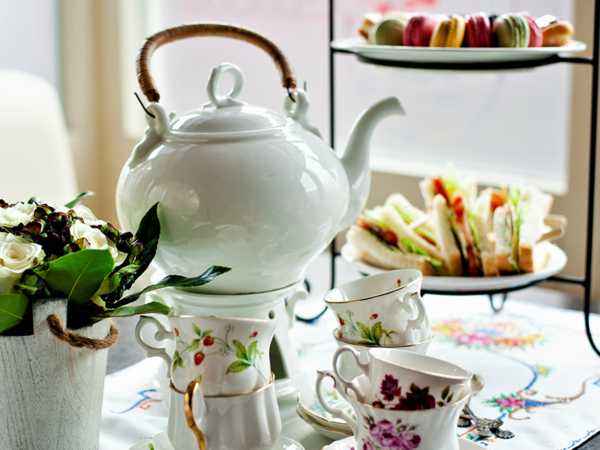
By 4:30 the first 100 people are munching on the goodies. I’m at the buffet tables explaining the savories and the sweets. The Utah Stewart is organizing people to wash dishes as people finish eating and setting for the next wave at 5:30. People are enchanted by it all. And then, at 6:15, very near the close, the Campbells walk in. Ian walks to the chieftain with his hand extended, “Welcome, welcome. Thank you for coming!” I’ve thrown a napkin at Utah Stewart, and she and her kitchen crew come out so they won’t miss it.
The Campbell takes a woven basket his lady is carrying, removes, and presents a Stewart tartan teddy bear holding a child’s book: “The Story of Bonnie Prince Charlie.” The bear, like the pelican, is a totem animal of the Stewarts. He says, “Contrary to what you may believe many Campbells died at Culloden fighting alongside the Stewarts and McDonalds. There were only two Campbells at Glencoe…” Ian responds, “Yes. The history is very complex. Let us believe we are all one kinship, a Scottish kinship.” And “yes” is the answer in the room, both clapping and voices asserting the truth of this.
The Campbell and his lady come to the buffet table and we help them with their plates. They feel solid and good to me – thump them and their note would sound true. Lady Campbell’s eyes are dark, laughing; she is genuinely interested in the offerings, asks for my family’s lemon curd recipe. When seated, Ian comes to be beside the Campbell, making a few comments of particular welcoming.
Utah Stewart comes out of the kitchen and up to me, puts her arm around my waist, and looks into my eyes. “I want you to know I am a Campbell. I’m a Campbell Stewart.” And we both grin. We’ve made a beginning. A Call and Answer.
Conclusion
I feel strongly that doing ancestor work can’t be motivated only by a larger, external purpose, e.g., to stop war, or heal racial splits. Our divides are by-products of our colonial Roots. Healing creates different by-products and ones I may not be able to predict. The doing of the work is not for the by-product. The motivation must be to heal the Root and Web of my own conflicts, to do my own work.
The unworked trauma of the colonizing empires is present in many of us today. Trauma embeds itself in the body/heart/mind/soul of a person until worked through. And it is passed down the generations. We have all been raised (consciously or unconsciously) in a conserve of colonialism.
This blog is encouraging you to consider the ancestral component when assessing if you can work a conflict successfully. So notice when an ancestral understanding and belief is challenged. The work must begin with you, and the conflict that has hooked you. To work that conflict may mean taking on the ancestral issues.
Your conflict partner may accuse you of “buying a pack of lies”. The idea of seeking a middle ground might be viewed as a betrayal of their “family values”, their ancestors. If your conflict partner refuses to do the work because the price is too high to separate from their conserve, then bless them, do your own ancestral work, and through you let the conflict cease to be a hook.
When you put your foot down in the Now,
you heal towards the generations ahead of us,
and back to the generations behind us. ”
Please comment on these questions or anything else you want to say:
Are you or have you been involved in a conflict whose root is a colonial inheritance?
What ancestral messages have you Engaged and healed?
What of your ancestral line are seeds full of life and blessing?

